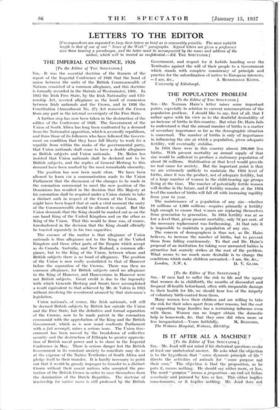THE IMPERIAL CONFERENCE, 1926
LETTERS TO THE EDITOR.
[Correspondents are requested to keep their letters as brief as is reasonably possible. The most suitaYe length is that of one of our " News of the Week" paragraphs. Signed letters are given a preference over those bearing a pseudonym, and the latter must be accompanied by the name and address of the auriwr, which will be treated as confidential.—Ed. THE SPECTATOR.) [To the Editor of THE SPECTATOR.] Sin,—It was the essential doctrine of the framers of the report of the Imperial Conference of 1926 that the bond of union between the units of the British Commonwealth of .Nations consisted of a common allegiance, and this doctrine is formally recorded in the Statute of Westminster, 1931. In 1935 the Irish Free State, by the Irish Nationality and Citi- zenship Act, severed allegiance as the bond of connexion between Irish nationals and the Crown, and in 1936 the Constitution (Amendment No. 27) Act removed the Crown from any part in the internal sovereignty of the Free State.
A further step has now been taken in the destruction of the edifice of the Conference of 1926. The Government of the Union of South Africa has long been confronted by a demand from the Nationalist opposition, which is avowedly republican, and from those of its followers who have followed the Govern- ment on condition that they have full liberty to work for a republic from within the ranks of the governmental party, that Union nationals shall cease to have a double allegiance as British subjects and Union nationals. Dr. Malan has insisted that Union nationals shall be declared not to be British subjects, and the replies of General Hertzog to this demand have been marked by the most remarkable obscurity.
The position has now been made clear. We have been allowed to learn rid a communication made to the Union Parliament that the discussion of the changes to be made in the coronation ceremonial to meet the new position of the Dominions has resulted in the decision that His Majesty at his coronation shall be required under a Union statute to take a distinct oath in respect of the Crown of the Union. It might have been hoped that at such a vital moment the unity of the Commonwealth should be allowed to stand. But the Union demands that the King should be marked out as on the one hand King of the United Kingdom and on the other as King of the Union. That this would be done was, of course, foreshadowed in the decision that the King should officially be toasted separately in his two capacities.
The essence of the matter is that allegiance of Union nationals is thus allegiance not to the King of the United 'Kingdom and those other parts of the Empire which accept as do Canada, Australia, and New Zealand, a common alle- giance, but to the King of the Union, between whom and British subjects there is no bond of allegiance. The position of the Union is now really assimilated to that of Hanover before the separation of the Crowns. There was then no common allegiance, for British subjects owed no allegiance to the King of Hanover, and Hanoverians in Hanover were not British subjects. Great credit is due to the ingenuity 'with which Generals Hertzog and Smuts have accomplished a result equivalent to that achieved by Mr. de Valera in 1935 without involving the resentment aroused by that statesman's legislation.
Union nationals, of course, like Irish nationals, will still be deemed British subjects by British law outside the Enion and the Free State, but the definitive and formal separation of the CrOwns, now to be made patent in the coronation ceremonial with the approbation of the King and the British Government, which as is now usual confronts Parliament with a fait accompli, raises a serious issue. The Union Gov- ernment has been moved by the breakdown of collective security and the destruction Of Ethiopia to greater apprecia- tion of British naval power and is to share in the Imperial Conference in. May. There is serious danger lest the British Covernment in its constant anxiety to Conciliate may do so at the expense of the Native Territories of South Africa and pledge itself to their transfer. It is hardly necessary to point out that it would be grossly improper to transfer to a distinct Crown without their assent natives who accepted the pro- tection of the British Crown in order to save themselves from the domination of the Dutch Republics. The doctrine of trusteeship for native races is still professed by the •British Government, and respect for it forbids handing over the Territories against the will of their people to a Government which stands with complete Consistency. of - principle and practice for the subordination of native to European interests.










































 Previous page
Previous page